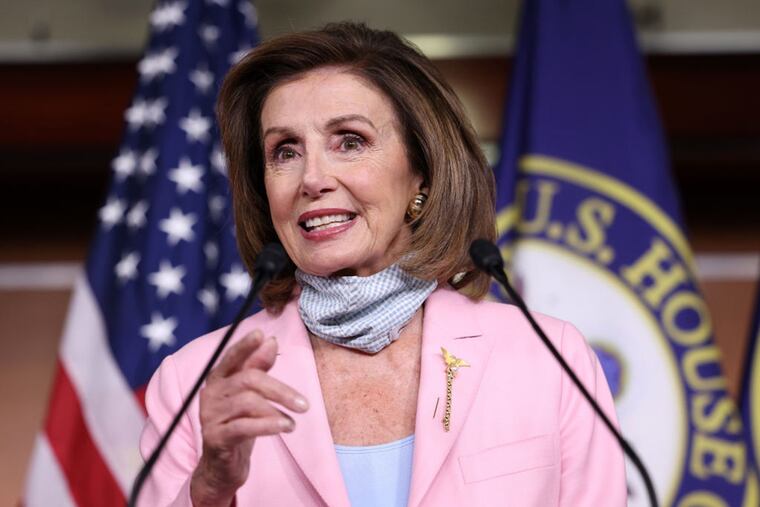Democratic divisions jeopardize the scope of Biden’s economic plan
The tax and spending package is facing obstacles in both the Senate and House.

Democratic congressional leaders vowed to forge ahead this month with President Joe Biden’s economic plan despite deep divisions within the party and growing uncertainty about the overall size and scope of the tax and spending proposal.
House Speaker Nancy Pelosi on Wednesday didn't specifically commit to the $3.5 trillion price tag included in a fiscal blueprint that very narrowly cleared both chambers before an August recess. Her remarks leave the door open to a smaller package that would appease party moderates and infuriate progressives.
"I don't know what the number will be," Pelosi said, adding that $3.5 trillion is the plan's initial size "and we will not go beyond that."
Speaking at a separate press event Wednesday morning, Senate Majority Leader Chuck Schumer said Congress will move forward on the legislation, and negotiate for the votes needed to clear it — regardless of the call by moderate Senator Joe Manchin last week for a “pause” on the debate and for a plan that would be “significantly” smaller.
"We're moving full speed ahead," Schumer said on a call with reporters. "We want to keep going forward. We think getting this done is so important to the American people for all the reasons we have outlined. It's so popular with the American people. So we are moving forward on this bill."
Pelosi, who faces challenges with a cluster of independent-minded moderates in her own chamber, insisted that Democrats are "very excited about what the prospects are" as House panels draft the specific text of the broad-based bill. The legislation would boost taxes on the wealthy and corporations while expanding Medicare, child care, elder care and addressing a host other issues include immigration and climate change.
Manchin last week in an op-ed called for a "strategic pause" in action on Biden's main economic agenda, saying that soaring national debt and rising inflation necessitate a go-slow approach and a lower price tag. Democrats govern the Senate with a 50-50 majority and need every senator in their caucus to back the plan, with Vice President Kamala Harris able to cast a tie-breaking vote.
The tax and spending package also is facing obstacles in the House. Democrats can only afford three defections in that chamber if Republicans are united in opposition, and some moderate Democrats also are balking at the size of the package being drawn up. Progressives, meanwhile, have pushed for a larger package and would likely balk at anything smaller than $3.5 trillion.
» READ MORE: Biden wants the sun to provide nearly half the nation’s electricity by 2050
Manchin is privately telling White House and Democratic leaders that he can't support a package that would be more than $1.5 trillion, Axios reported late Tuesday. He also wants revenue from tax increases to cover all of the cost, according to Axios. A spokeswoman for Manchin declined to comment.
The Biden administration is planning to shift more of its pitch to highlighting revenue measures, such as those aimed at corporations and higher-income earners, that are part of the package — an implicit effort to calm fears among moderates about the total spending amount and emphasize that it's not simply deficit-funded, according to an official familiar with their plans.
Biden believes the tax changes are an important component, both out of fairness and as a revenue measure, the official said.
The administration continues to speak with Manchin and is confident an agreement can be reached, the official said. It doesn't believe any clear topline spending cap has emerged among the moderates, according to the official.
The president said on Tuesday that he would soon speak to Manchin. “Joe, at the end, has always been there. He’s always been with me. I think we can work something out. And I look forward to speaking with him,” Biden told reporters at the White House.